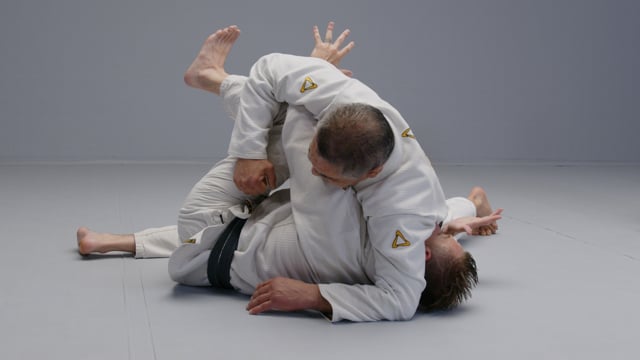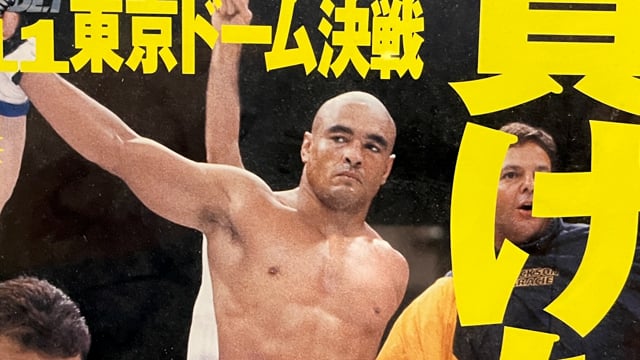In more than 50 years on the mat, Rickson Gracie masterfully learned two things. The first one was fighting. The second was to observe human behavior.
Which includes, of course, seeing with depth the behavior of students and practitioners. Or ex-practitioners, a slice of humanity that Rickson thinks and reflects upon again and again.
"I estimate that today, for every blue-belt who graduates at a jiujitsu school, about a hundred other practitioners drop out before they leave the white belt," Gracie calculates. "And most don't come back to try again ever. So that's hundreds, thousands of people who feel they weren't born to fight, that the challenge isn't quite what they were looking for. They stop training before they discover that jiujitsu was developed just for them."
Rickson is even able to point out the exact point at which most practitioners drop their gi. It is the so-called "beasts on the loose" thesis, which would be fun if it were not a disaster for gym administrators—and for the health of humanity as well, since practicing jiujitsu is an excellent way to fight obesity, sedentary lifestyles and depression. Among many other problems, of course.
But let's get back to the thesis. The "beasts on the loose" thesis, as Rickson masterfully explained on Jocko Willink's podcast:
"When the student comes to the gym for the first time and learns a technique, he falls in love. There's no one who doesn't enjoy learning jiujitsu. The crux of the matter is when the instructor calls the student and asks him to lie down, and calls another and asks him to mount. 'You, hold the mount!' 'You lying down, try to escape!' There, at that point we unleash the beasts. The instincts are unleashed and nature is a little out of control. And none of this depends on the nature of the white-belt: that confrontation naturally opens the door to a slightly rougher movement, to an uncomfortable grip, to an unpredictable aggressiveness for them. Some enjoy the excitement and come back. Most never return."
According to Rickson, this ordeal, this mental test, can be perceived—and usually is—as the worst of nightmares for the novice student. He doesn't want to be confronted with his weaknesses; he didn't enroll or leave home that day to feel discomfort. Only the rarest minds will think, "It's okay; I suffered today, but I'll be back, I'll improve day by day and I'll make up for it." To avoid being confronted with so many feelings, 90% of the students simply stop and look for another activity.
Rickson's idea for the future of jiujitsu teaching, therefore, follows another, smoother, less bumpy path:
"Today the prevailing system in most schools is still to learn by training against another practitioner. The master may protect the beginner in the first month, but at some point he will need to compete against another practitioner. This requires that every day that the person comes to the academy he has to test himself, show that he is tough, confront his own fears on a daily basis. My idea to improve this is to create a level where the jiujitsu practitioner will be able to learn and experience in depth the essential concepts of the martial art without being forced to roll. He will train his breathing, his levers, the right angles for each position, the efficiency of self-defense, all with the help of the instructor or a collaborative training partner, not a rival wishing to finish him."
Rickson then details the idea: "At least in the first year of jiujitsu, the practitioner should not confront opponents, only test himself with actual training partners. After a year, those who want to continue that way stay, those who want to test their game and go pass the guard of others go to the other class. With this, the teacher gives the student time to lose weight, feel good, understand the benefits of jiujitsu, and never leave again. I want to see this still in my life, a jiujitsu that is really perfect for any member of the family, without the need to prove anything on the mats."
Watch the full class here!
Watch the full class here!


Comments
I've been taking my grand kids to BJJ for a year now. I've seen all of this play out in them, and their different personalities.
Sua inteligência sobre fatores psicológicos é enorme, Mestre Rickson! Assim como sua técnica! Esse método das academias de jiu-jitsu, de colocarem em combate alunos que ainda não têm as técnicas bem assimiladas, não é um bom método. Algumas academias de kung fu fazem do jeito que você deseja: primeiro, aprenda bem as técnicas, depois faça combates. Ou acontece também de o próprio aluno se auto-analisar: quando eu comecei numa academia de kung fu, eu já era o aluno mais dedicado, sempre amei artes marciais porque conheço (e percebo) seus enormes benefícios; então, com apenas 2 meses de academia, o meu professor me pedia pra iniciar a aula quando ele estava conversando com visitas, e me pediu também pra representar a academia num campeonato de kung fu. Eu me senti super honrado, mas agradeci e disse que queria tornar minhas técnicas mais automáticas primeiro, pra depois participar de campeonatos.